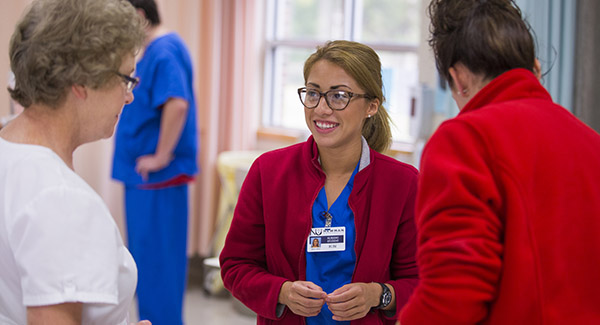Rabindranath Tagore once said, “Let life be as beautiful as summer flowers and death as beautiful as autumn leaves.”
Associate Professor of Nursing and Geriatric nurse Amy Siple has a real passion for caring for people at the end of life.
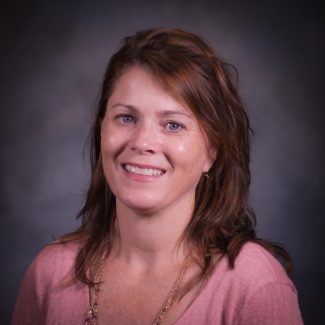
“One of the challenges that I consistently face is that people are actively dying and so many folks are trying to aggressively manage a disease and stop taking care of a person,” Siple explained, “and so I had this thought about what if we offered a class to future health care providers in which we help them become more comfortable with death and we talked about what it looks like to die well and how can we make this a more peaceful transition.”
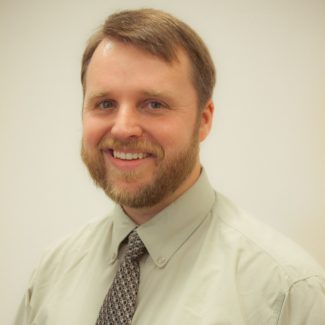
Siple paired up with Assistant Professor of Theology Matthew Umbarger and together they created an NSP Course called “Dying Well” a year ago.
Siple said, “I think it’s been a good match bringing in the theology portion (into an NSP course) because I certainly see clients struggling with the spiritual needs as they’re dying,” she continued, “and then students are also struggling with the spiritual aspects of people taking care of them, and they haven’t come to terms with their own mortality, their own death and all the questions they have about pain and suffering. So this is just such a neat way to help them work through all that before it faces them head on when they’re taking care of their own clients.”
“Dying Well”, involves a weekly volunteer experience with clients who are on hospice and are near death. During their visits they may put a puzzle together with their client, read to them, give them a manicure or a variety of other activities. The clients and families love the students and they are creating a large impact.
Newman student Sarah Crook, who is taking the NSP course, said that taking the course, “gives me a better perspective on whether or not the health profession is for me because if I can’t work with people at the ends of their lives what makes me think that I can help them when they’re going through a sickness that could potentially lead to a worse road. If they’re in a disease state and if I think I can cure them, what if I can’t cure them? It’s a good way to get some social skills when I have to deliver bad news or good news.”
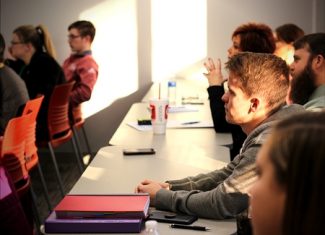
Umbarger mentioned that, “Sometimes doctors get a bad rap in our course because they are clinical and so professional. Also they are always trying to cheat death by any means possible and Professor Siple really has this approach of always offering healing service that not always tries to treat the disease. Sometimes you have to help them transition comfortably rather than curing. We can’t cure all the time, eventually non of us are going to be cured, and so a lot of the doctors have a hard time with this kind of mindset because they’ve been trained to cure to the very end.”
Clair Sutter, a student also taking the course, said, “I never realized how important the work is. Just a simple conversation makes a big difference and I feel like it will really help me later in my career, taking that skill of what I learned, and applying it later on.”
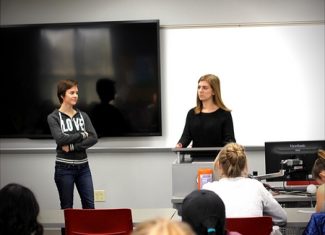
Every student has made a large impact on the clients they have visited throughout the course even if they felt like they weren’t.
“We’ve been told that a couple of family members said, ‘You know we hear so many negative things about the younger generation, but if this is what the younger generation looks like, we’ve completely changed our opinion’,” Siple said. “[A student] that spent time with a client last year said, ‘You know, I would go every week and just do puzzles with [my client] and I wasn’t very good at the puzzles, and I didn’t think I was doing anything because we didn’t talk very much, and then at one point [my client] just looked up at me and said, ‘Every week I look forward to you coming’.”
Throughout the course, students are able to put themselves in their patient’s shoes. This gives them the perspective on how they would want their hospice care to be like. Sutter explained, “Putting myself in their shoes is an important thing. It’ll make you realize that you should treat people the way you want to be treated and that’s important, especially in hospice.”
“They still have dreams, they still have things that they want to do, it’s not the end for them yet. They are still alive and they still want to do all these things,” Crook added.
The interest of this course is not the ethical quandaries that come from death and dying, but the way human beings react, relate, and venerate the dead and dying, and the philosophical and sociological ramifications for how this is done.
